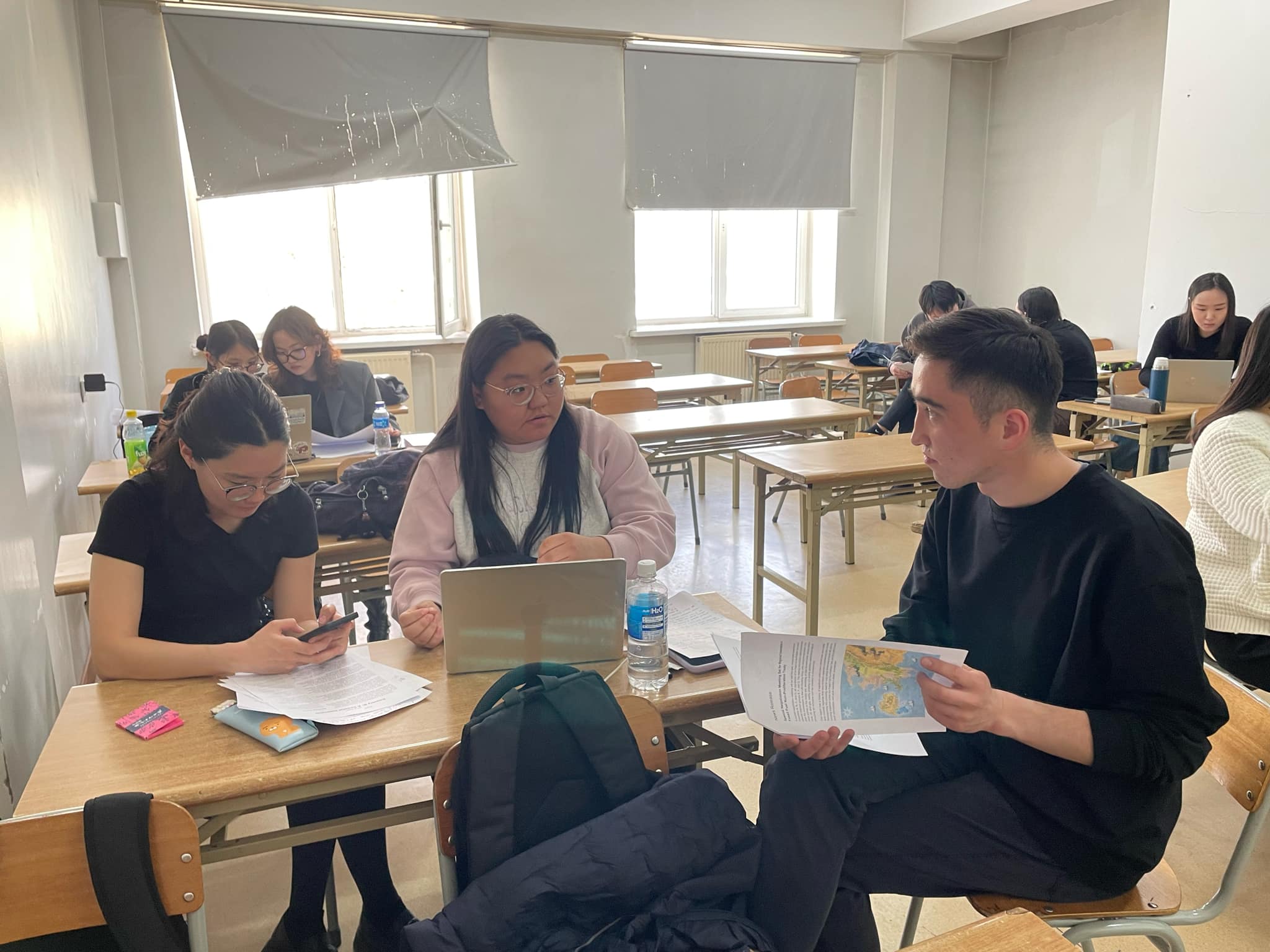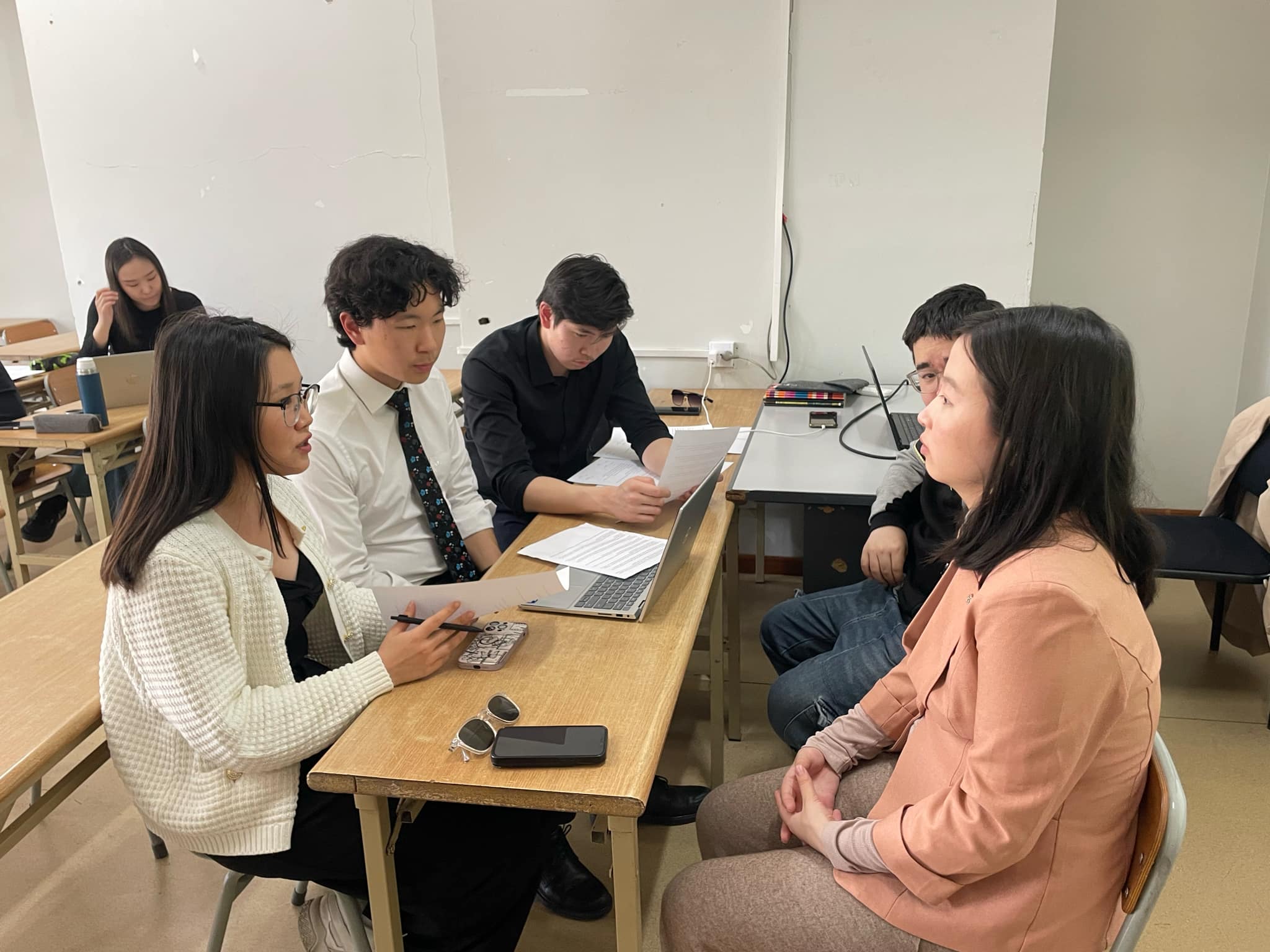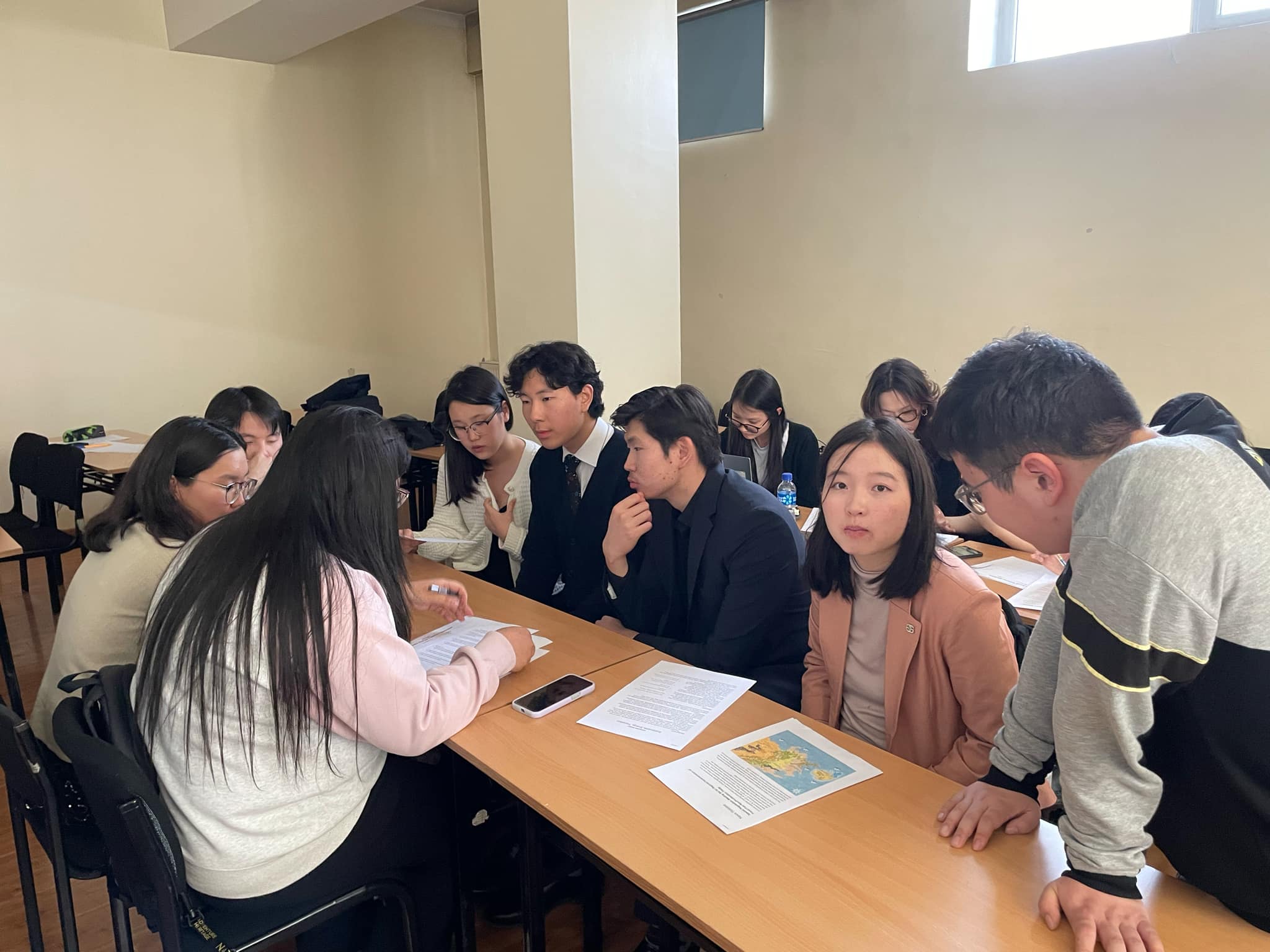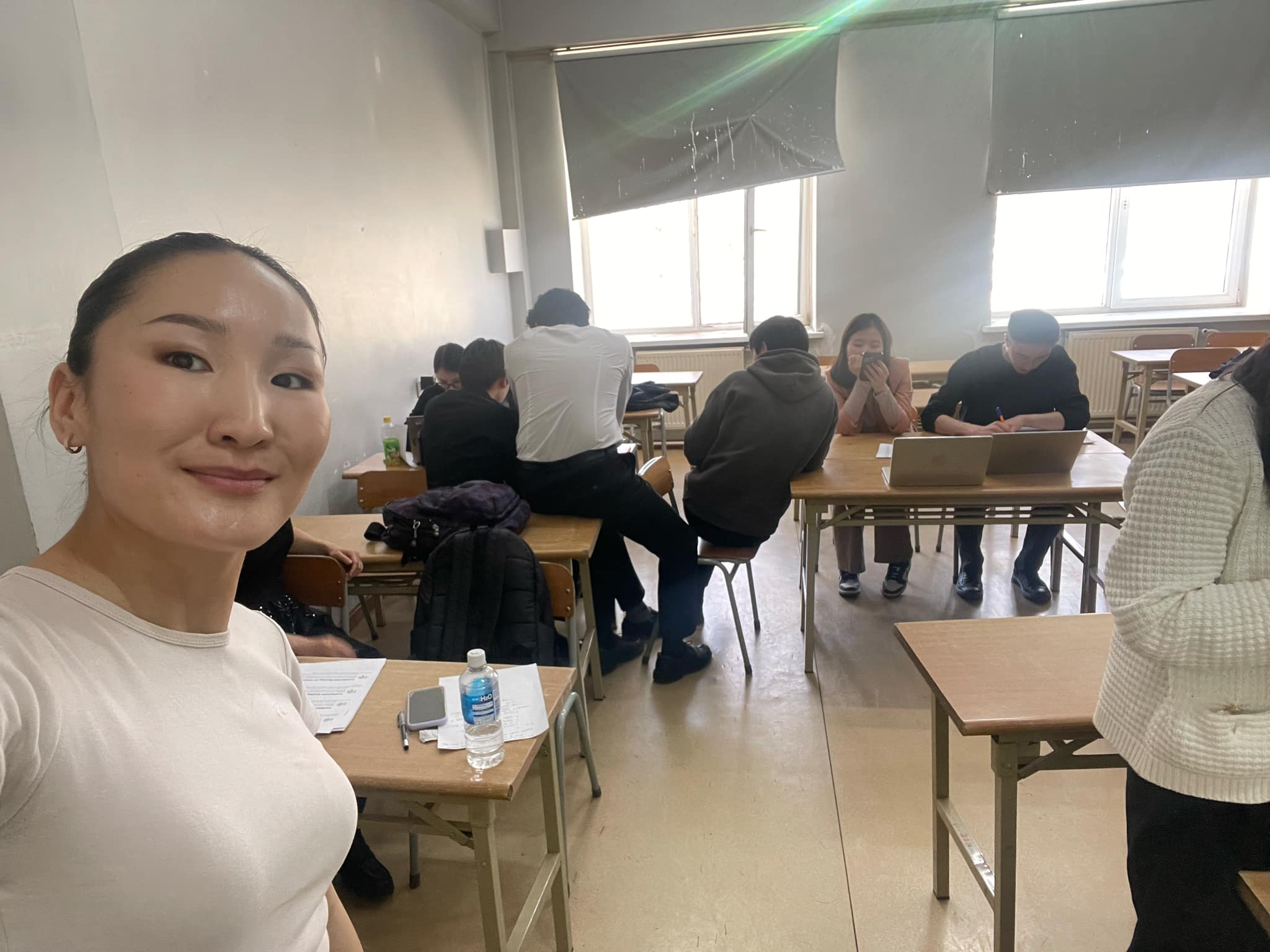- “ОЛОН УЛСЫН ХАРИЛЦАА” СЭТГҮҮЛД ӨГҮҮЛЭЛ ХҮЛЭЭН АВАХ ХУГАЦААГ СУНГАЛАА
- “ОЛОН УЛСЫН ХАРИЛЦАА” СЭТГҮҮЛД ӨГҮҮЛЛЭЭ ИРҮҮЛЭХИЙГ УРЬЖ БАЙНА
- МУИС-ийн Улс төр судлал, олон улсын харилцаа, нийтийн удирдлагын сургууль ХБНГУ-ын Фридрих Эбертийн сангийн Монгол дахь суурин төлөөлөгчийн газар хамтран ажиллана
- Монгол-Японы Их сургууль хоорондын хамтын ажиллагаа бүс, орон нутгийн хүрээнд өргөжиж байна
- Монгол Улсын Их Хурлын гишүүн, Засгийн газрын гишүүн, Гадаад харилцааны сайд Батмөнхийн Батцэцэгт
- “Төрийн үйлчилгээний процессын дахин инженерчлэл” зэргийн бус сургалтын гэрчилгээ гардууллаа
- ЕРӨНХИЙЛӨГЧИЙН ИТАЛИ БОЛОН ГЭГЭЭН ШИРЭЭТ УЛСАД ХИЙСЭН АЙЛЧЛАЛЫН БҮРЭЛДЭХҮҮНД ОУХТ-ИЙН БАГШ НАР БАГТАВ
- “Улс төрийн мэдээлэл харилцааны онол, судалгааны арга зүй”, “Улс төрийн мониторинг, мэдээлэл боловсруулах арга зүй” хичээлүүдэд зочин багшийн хичээл орлоо
- “Хүний нөөцийн менежментийн улсын XIV олимпиад”-д МУИС-ийн УТСОУХНУС-ийн баг хамт олон амжилттай оролцлоо
- УТСОУХНУС-ийн Оюутны зөвлөлөөс зохион байгуулсан Эрдэм шинжилгээний хурал амжилттай болж өнгөрлөө
- Нийтийн удирдлагын тэнхимийн бакалаврын түвшний оюутнуудын эрдэм шинжилгээний хурал боллоо
- ЗХААБССХ болон УТСОУХНУС хамтын ажиллагааны санамж бичигт гарын үсэг зурлаа
- МУИС-УТСОУХНУС-ийн Нийтийн удирдлагын тэнхимийн ахисан түвшний эрдэм шинжилгээний хурал амжилттай болж өндөрлөлөө
- УТСОУХНУС-ийн ОУХ-ны хөтөлбөрийн Ахисан түвшний магистрант, докторантуудын намрын улирлын эрдэм шинжилгээний хурал амжилттай зохион байгуулагдлаа
- УТСОУХНУС-ийн ОУХарилцааны хөтөлбөрийн бакалаврын түвшний эрдэм шинжилгээний хурал амжилттай зохион байгуулагдлаа
- International relations program graduates donated professional textbooks
- Хамтын ажиллагааны санамж бичигт гарын үсэг зурлаа
- 2025-2026 оны ээлжит МУИС-УТСОУХНУС Оюутны Зөвлөлийн зохион байгуулсан
- “ПОЛИТОЛОГИ” ЭРДЭМ ШИНЖИЛГЭЭНИЙ СЭТГҮҮЛИЙН 24 ДЭХ ДУГААРТ ӨГҮҮЛЭЛ АВЧ ЭХЭЛЛЭЭ
- УЛС ТӨР, ОЛОН УЛСЫН ХАРИЛЦАА, НИЙТИЙН УДИРДЛАГЫН СУРГУУЛЬД “СУДАЛГААНЫ ИХ СЕМИНАР” БОЛЛОО
- “Төрийн үйлчилгээний процессын дахин инженерчлэл” зэргийн бус сургалтын хөтөлбөрийн нээлт боллоо
- Судалгааны их семинар амжилттай зохион байгуулагдлаа
- УТСОУХНУС Японы Нийгата мужийн их сургуулийн хамтарсан хөтөлбөрийн талаар ярилцав
- Судалгааны их семинар болно.
- Public Administration Week 2025 Concludes at NUM with Meaningful Dialogue, Research, and Recognition
- ТАЛАРХАЛ
- “Best Paper Awards” was successfully held.
- “Төрийн бодлого” номын нээлт
- NUM Leadership XIV International Conference Explores “Public Administration of the Future”
- “МУИС – МАНЛАЙЛАЛ – ШИЛЖИЛТИЙН ҮЕИЙН ЧАДАВХЫН ХӨГЖИЛ”, ОЛОН УЛСЫН ЭРДЭМ ШИНЖИЛГЭЭНИЙ ЦУВРАЛ XIV ХУРЛЫН ХҮНДЭТ ЗОЧДЫГ ХҮЛЭЭН АВЧ УУЛЗЛАА.
- UB Impulse XXIV Explores “Resource Rivalries: The Politics of Critical Minerals”
- ХБНГУ-ын Шпайерын Төрийн Удирдлагын Их Сургуулийн Ректор Проф. Др. Холгер Мюленкамп МУИС-н оюутнуудад лекц уншлаа.
- “Нийтийн удирдлагын долоо хоног” эхэллээ
- Celebrating the International Day of Peace: Insights from Nick Millward and Oyunsuren Damdinsuren
- МУИС-ийн УТСОУХНУС-ийн захирал С. Мөнхбатыг Монгол Улсын Төрийн албаны зөвлөл хүлээн авч уулзлаа
- Нийтийн удирдлагын тэнхимийн зочин профессор Др. Жон Даффигийн нэрэмжит "Best paper awards"-д оролцохыг урьж байна
- SPSIRPA and ERINA-UNP joint international conference “Regional Economies in a Shifting World Order: Northeast Asia Amid Global Uncertainty”
- Нийт төгсөгчдөдөө баярын мэнд хүргэе
- SPSIRPA OSCARS 2025 БОГИНО ХЭМЖЭЭНИЙ КИНО НААДАМ амжилттай болж өндөрлөлөө
- МУИС-ийн УТСОУХНУС болон БНХАУ-ын Жилиний Их Сургуулийн хамтын ажиллагааны уулзалт
- “How different cultures have resolved conflicts before the Geneva Conventions” (A Guest Lecture by Dr. Samuel White)
- Хамтын бүтээл хэвлэгдэн гарлаа
- АВСТРАЛИ УЛСААС МОНГОЛ УЛСАД СУУГАА ЭСЯ-Д ЗОЧИЛСОН НЬ
- УТСОУХНУС-ийн оюутны эрдэм шинжилгээний хурал боллоо
- МУИС-ийн Улс төр судлал, олон улсын харилцаа, нийтийн удирдлагын сургууль БНСУ-ын Чоннам их сургуультай хамтын ажиллагаа байгуулахаар тохирлоо
- THE U.S. FOREIGN SERVICE AND DIPLOMACY IN THE 21ST CENTURY (A Guest Lecture by Mr. Moulik D. Berkana)
- SPSIRPA FORUM 2025 олон улсын эрдэм шинжилгээний хурал боллоо
- МУИС-ИЙН УЛС ТӨР СУДЛАЛ, ОЛОН УЛСЫН ХАРИЛЦАА, НИЙТИЙН УДИРДЛАГЫН СУРГУУЛЬ БНСУ-ЫН СҮНГШИЛ ИХ СУРГУУЛИЙН НИЙГМИЙН УХААНЫ СУРГУУЛЬТАЙ ХАМТЫН АЖИЛЛАГААНЫ САНАМЖ БИЧИГ БАЙГУУЛЛАА
- УТСОУХНУС-ийн Улс төр судлалын тэнхимийн ахисан түвшний оюутнуудын эрдэм шинжилгээний хурал боллоо
- 2025 оны SPSIRPA форумд дэлхий дахины геополитикийн өөрчлөлтийн талаар хэлэлцэнэ
Peace Game
Simulating Peace: A Fossil Fuel Non-Proliferation Treaty in Action
By Irmuunbileg Uitumen
On April 21, 2025, in a dynamic session of the International Conflict Resolution (INRE404) course taught by Ms. Oyunsuren Damdinsuren, students participated in a hands-on peace game simulation. The activity was facilitated by a SPSIRPA alumna Ms. Zolzaya Nyamdorj, who currently serves as a board member at the Mongolian Peacebuilding Institute (MONPI).
The primary objective of the simulation was to explore practical strategies for peacebuilding starting at a micro level. Students were divided into seven groups, four representing fictional countries and three acting as non-governmental organizations (NGOs). The focal issue of the peace game was the implementation of a Fossil Fuel Non-Proliferation Treaty.
Participants received detailed background materials a week in advance, including geopolitical briefings, their assigned group’s stance on the treaty, and contextual information about international relations. This preparatory work laid the foundation for an immersive and informed experience as students had to prepare for the peace game as a team and build strategies on how to successfully reach their desired outcome.
Ms. Zolzaya opened the session by briefing participants on the simulation’s rules and structure. The peace game unfolded in several rounds. The initial rounds focused on introducing the representatives of each country to one another, during which the representatives engaged in bilateral talks to familiarize themselves with one another’s stance and interests whilst the NGOs followed along countries taking notes. Following this phase, the NGOs entered the stage presenting proposed conclusions regarding the treaty research findings, expressing their interests, and outlining their concerns.
With the groundwork laid, the simulation shifted into a series of multilateral meetings involving countries and NGOs. One of the NGOs took on the role of a mediator, facilitating dialogue and encouraging collaborative approaches to treaty negotiations. During this stage countries discussed and negotiated their concerns for renewable energy technology, transitions from fossil fuel to renewable energy, as well as geopolitical issues, and national security. Through this interactive format, students gained firsthand experience in navigating complex diplomatic dynamics, building consensus, and balancing national interests with global sustainability goals.
As the simulation progressed toward its conclusion, the four country groups drafted their action plans. Most of these plans demonstrated a strong commitment to inclusivity, ensuring that no party’s interests were overlooked nor sacrificed. The participants emphasized the value of peace, and the complexities involved in sustaining it. Each group voted democratically on their final proposals, embodying the spirit of collaboration and mutual respect that underpinned the entire exercise.
The peace game not only deepened students’ theoretical understanding of conflict resolution but also offered valuable insights into the practical challenges of diplomacy. It underscored the importance of inclusive dialogue, active listening, and compromise in addressing global issues such as fossil fuel dependency and the transition to renewable energy.



